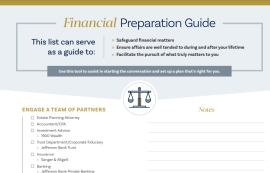Estate planning involves preparing legal documents that outline your wishes for the distribution of your assets upon death or incapacitation. This includes wills, trusts, powers of attorney, and other essential legal instruments. Many people mistakenly believe that estate planning is only for the wealthy, but it is vital for everyone, regardless of their estate size. Proper estate planning can:
Proper estate planning can help to:
- Ensure your wishes are carried out regarding the distribution of your assets.
- Minimize estate taxes.
- Avoid probate court complications.
By planning your estate now, you can save precious time in the future and focus on what truly matters. Even a basic estate plan can ensure your wishes are followed and your loved ones are cared for. Learning the basics now can help you avoid emergency estate planning later in life. Set aside time to create an inventory of assets, decide who will inherit them, and consult the Trust Advisors at Jefferson Bank today. While it may not be the most exciting part of building your future, it’s essential for securing it.
Who Needs Estate Planning?
Anyone with assets, dependents, or specific wishes for their property needs an estate plan. Young professionals and families, in particular, benefit from early planning as it secures their business interests and personal assets.
"When you think of what you want to pass on at the end of your life, it's so much more than money," says Shawn P. Hughes, JD, Senior Vice President, Estate & Trust Officer. "Relationships, memories, values, and of course financial assets are important for helping your family achieve and pursue their passions and dreams." Estate planning is multi-faceted, encompassing your legacy, values, and the emotional well-being of your loved ones.
By planning early, you can ensure that these invaluable elements of your life are protected and that your family is well-prepared to carry forward your legacy.
When to Start Estate Planning
One of the biggest myths about estate planning is that it’s only necessary when you’re older or dealing with substantial wealth. The reality is, the sooner you start, the more prepared and secure you’ll be. Let’s delve into practical steps to avoid emergency estate planning and ensure your legacy is safeguarded well in advance.
The Early Years
Starting your career, getting married, or having children are perfect reasons to begin your estate planning. Create a will, set up trusts, and consider other legal instruments like durable power of attorney and insurance protections.
The Middle Years
In your middle years, your goals may shift, requiring a review and revision of your will. Focus on retirement goals and college savings for your children. Ensure your plan evolves with your changing priorities.
The Later Years
In retirement, it’s essential to have all your documents in order. Work with your attorney to ensure your living will, healthcare power of attorney, and a letter of instructions are updated and organized, making it easier for your loved ones in the long run.
Steps to Creating Your Estate Plan
Before diving into the intricacies of estate planning, it helps to have a clear and concise roadmap. Think of this checklist as your estate planning GPS—guiding you swiftly and smartly through the essential tasks to ensure nothing important gets overlooked. Here's your quick-start guide to crafting a bulletproof estate plan:
Step 1: Understand Your Circumstances and Take Inventory
Begin by evaluating your current situation. Take stock of your assets, liabilities, and any unique family dynamics. Understanding your circumstances will help you identify what needs to be addressed in your estate plan.
- List Physical Assets: Home, real estate, vehicles, jewelry, etc.
- Financial Statements: Bank, brokerage, and retirement accounts.
- Insurance Policies: Life, health, and other insurance policies.
- Liabilities: Mortgages, lines of credit, and other debts.
Step 2: Understand Factors That Affect Your State
Different states have different laws governing estate planning. Make sure you understand how local regulations will affect your estate. Consulting with a local estate planning attorney can provide clarity. In Texas, you will want to ensure you have a valid will, durable power of attorney, and medical power of attorney so that your estate is handled according to your wishes and that
your designated individuals can make decisions if you're incapacitated.
Step 3: Clarify Your Goals and Objectives and Draft Estate Plan
Define what you want to achieve with your estate plan. Are you focused on protecting your children’s future? Or perhaps you want to ensure that your business continues smoothly in your absence? Clear goals will guide the entire process.
- Inheritance: Decide who inherits your assets and in what proportion.
- Care for Children: Specify guardians and financial provisions.
- Incapacity Planning: Determine who manages your affairs if you’re incapacitated.
Step 4: Set up a Trust Account. Consolidate When Necessary
Trusts can offer several benefits, such as avoiding probate, reducing estate taxes, and providing for minor children. Consider setting up a trust to manage your assets more effectively.
Simplify your financial landscape by consolidating your accounts where possible. Multiple accounts can complicate estate management and may result in assets getting overlooked.
Step 5: Putting Your Plan into Action
- Fund Your Trust: Ensure all assets in your trust are retitled to reflect this ownership change.
- Review Beneficiaries: Update beneficiaries on all accounts and policies.
- Keep Copies: Maintain copies of all documents and inform trusted individuals of their location.
Step 6: Review and Adjust
Regularly review and update your estate plan to ensure it reflects your current wishes and circumstances. Life changes like marriage, the birth of a child, or a new business venture should prompt a review of your plan.
- Periodic Review: Every 5 years or upon significant life events.
- Beneficiary Updates: Keep beneficiaries current to ensure your wishes are honored.
- Document Updates: Refresh outdated documents to reflect your current situation and wishes.
Remember, estate planning is not a one-and-done task but an evolving process that should adapt with your life's milestones. By staying proactive and keeping your plans current, you not only safeguard your assets but also bring peace of mind to yourself and your loved ones—proving that a well-thought-out estate plan truly is the ultimate gift to those who matter most.
Creating an Estate Planning Binder
Having an estate planning binder for each family member is crucial for ensuring that all important documents are readily accessible during times of need. Following the advice of Mary Ellen Archer, Vice President, Private Banking Officer, you should ensure your preparedness by compiling an Emergency Binder for each family member, which should include:
- A Will
- Medical and Statutory Powers of Attorney
- HIPAA Authorization
- Do Not Resuscitate (DNR) Orders
- Medical Directives
- Passwords (to access bank accounts, online billing, subscriptions etc)
- Account numbers and location of accounts (this includes checking, savings, retirement accounts etc)
- Birth certificates
- Marriage Certificates
- Social Security Numbers
Store this binder in a safe place at home, and ensure your family members know its location, contents, and the scenarios in which it might be needed. Archer reminds us to periodically remind your family of this crucial resource, ensuring everyone remains informed.
Your Trust, Our Expertise: Estate Planning with Jefferson Bank
Estate planning isn’t just for the affluent or the aging; it’s a vital process for anyone who values their family and assets. Imagine a future where your loved ones are protected, and your financial legacy is preserved just as you envisioned. Starting early and keeping your plan updated can prevent emergencies and ensure your desires are respected.
At Jefferson Bank, we don’t just offer estate planning; we provide peace of mind. Our seasoned advisors specialize in estate planning, financial management, and wealth preservation. We understand that each client is unique, and we tailor our services to meet your individual needs and circumstances. We offer comprehensive strategies that encompass everything from asset
protection to charitable giving, ensuring that your legacy endures and makes a meaningful impact.
Jefferson Bank is your steadfast partner in securing your future. We offer a suite of financial services, including investment management and retirement planning. Our approach ensures that all aspects of your financial well-being are addressed, giving you the freedom to enjoy life knowing that your affairs are in order.
Don’t wait for a crisis to start planning. Get started today by downloading your Financial Preparation Guide and take the first step towards a secure and prosperous future. We look forward to helping you build, protect, and preserve your legacy.
Download our Financial Preparation Guide and Checklist








